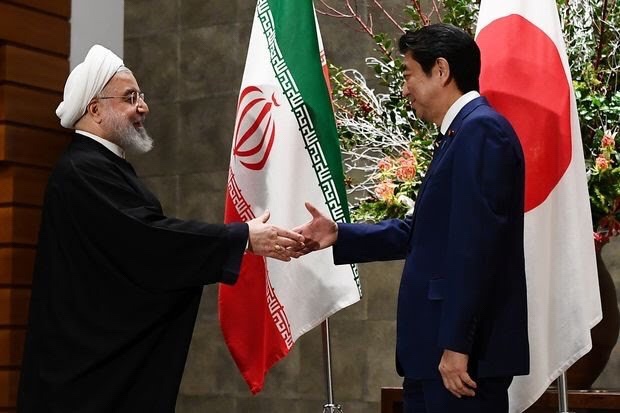Japanese Prime Minister Shinzo Abe greeted Iranian President Hassan Rouhani in Tokyo on Friday.PHOTO: POOL/REUTERS
Shinzo Abe urges visiting Iranian president to abide by 2015 agreement
By Chieko Tsuneoka
Updated Dec. 20, 2019 10:44 am ET
TOKYO—Japan urged Iran to adhere to a 2015 nuclear deal as their leaders met on Friday, but Iran’s president said Washington was at fault for Mideast tensions because it pulled out of the multinational accord.
President Hassan Rouhani, the first Iranian leader to visit Japan since 2000, met Prime Minister Shinzo Abe, who has sought to serve as a mediator between the U.S. and Iran, a longtime friend and oil supplier to Tokyo.
In three hours of talks including a dinner, Mr. Abe expressed grave concerns over Iran’s moves toward breaching the 2015 agreement, which limited Iran’s nuclear program in exchange for economic incentives, according to a Japanese official. Mr. Abe called on Tehran to cooperate with the International Atomic Energy Agency.
“Japan hopes to play a role as much as possible for easing tensions in the Middle East region and stabilizing the regional situation,” Mr. Abe said at the beginning of the meeting in front of reporters.
Mr. Rouhani showed no public sign of budging. Speaking through an interpreter, he said he strongly denounced the U.S.’s “unilateral and irrational withdrawal” from the 2015 deal.
Iran has gradually disengaged from the nuclear deal as a way to pressure European countries to provide promised relief from U.S. sanctions. Its steps so far have been largely inconsequential for its potential path to a nuclear weapon and haven’t significantly cut the time it would need to enrich weapons-grade uranium.
But Iranian officials acknowledge that they are running out of options for step-by-step escalation at a low risk, according to Western diplomats. European powers have warned that any further steps by Iran away from the nuclear deal would force them to trigger a dispute mechanism which could ultimately kill off the agreement.
Iran has said it would remain in compliance with the agreement if U.S. sanctions are lifted and European countries make a special payment channel with Iran operational. Iranian officials have repeatedly said the country is willing to meet with the Trump administration, but only if sanctions are lifted.
Amid escalating tensions in the Persian Gulf, some world leaders are urging the U.S. and Iran to begin talks on a possible new nuclear deal. But neither side seems willing to make the first move. Photo: Stefan Rousseau/Zuma Press
As the sanctions have exacerbated Iran’s economic crisis, Tehran has pushed back against the U.S. with asymmetric tactics. It downed a U.S. drone over the Persian Gulf, impounded a British oil tanker and, according to the U.S., sabotaged tankers off its southern coast and attacked Saudi oil facilities. Iran denies the U.S. accusations.
Mr. Abe’s visit to Tehran in June, another mediation attempt, was marred by an attack on a Japanese ship in the Gulf of Oman that the U.S. blamed on Iran. Tehran said it wasn’t responsible. That was the first visit to Iran by a Japanese leader since the 1979 Islamic Revolution.
The U.S. has put together a naval coalition to safeguard navigation in the region and has urged Japan to contribute to the effort.
Mr. Abe described to the Iranian leader Tokyo’s plan to send the Japanese military to waters near Iran for information-gathering to secure shipping safety, according to the Japanese official. The effort would be independent of the U.S.-led coalition.
Mr. Abe sought Mr. Rouhani’s understanding for the Japanese mission, and Mr. Rouhani effectively gave his nod, the Japanese official said.
Japan was a major buyer of Iranian crude oil until this year, but it stopped purchases to comply with U.S. sanctions, the Japanese government said.
“I welcome any effort that could boost economic exchanges, especially in the energy sector, and increase oil exports,” Mr. Rouhani said in a tweet following the meeting with Mr. Abe. “Other parties must also keep up to their commitments,” he said.
—Sune Rasmussen in Beirut contributed to this article.
Write to Chieko Tsuneoka at chieko.Tsuneoka@dowjones.com
No comments:
Post a Comment